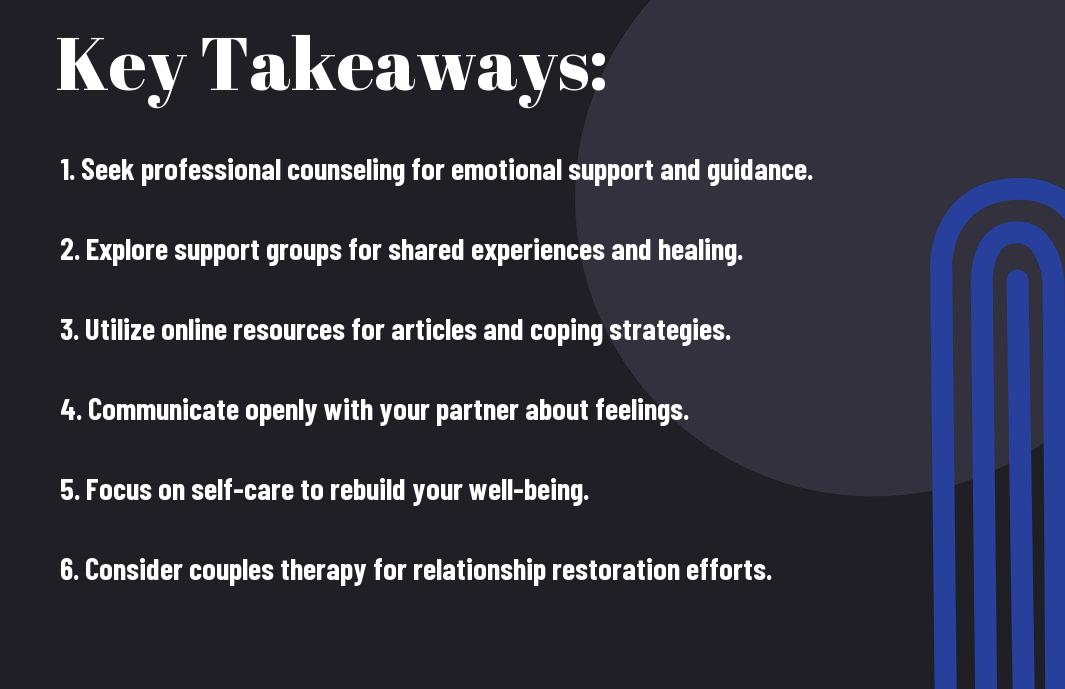Infidelity can be a devastating experience that leaves you feeling lost and heartbroken. It’s vital to seek support and access the right resources to navigate your emotions and rebuild your life. In this blog post, you will discover effective counseling services and trustworthy support networks designed to help you cope with this painful situation. Understanding the available options can empower you to take steps toward healing and finding a path forward, whether you decide to repair your relationship or focus on personal growth.
Key Takeaways:
- Infidelity can deeply impact relationships, often leading to emotional turmoil and distress for both partners.
- Open communication is vital; discussing feelings and concerns openly can help both partners understand each other’s perspectives.
- Seeking professional counseling can provide a supportive environment for couples to navigate their emotions and develop coping strategies.
- Support groups and online forums can offer additional resources and a sense of community for those dealing with the aftermath of infidelity.
- Understanding the underlying reasons behind infidelity can help partners rebuild trust and work towards healing.
- Investing time in self-care and individual growth can empower partners to move forward, whether together or apart.
- Establishing clear boundaries and setting goals for the relationship can help both partners feel more secure in the healing process.


Understanding Infidelity
While infidelity can be a devastating experience, understanding its nature can help you navigate the turmoil. By gaining insights into the various definitions and types of infidelity, you will be better equipped to recognize what has occurred in your relationship and reflect on its implications for your emotional well-being.
Definitions and Types of Infidelity
Types of infidelity can vary greatly, encompassing several categories that may help explain your experience:
| Emotional Infidelity | Developing a deep, emotional connection outside your relationship. |
| Physical Infidelity | Engaging in sexual activities with someone other than your partner. |
| Online Infidelity | Romantic or sexual interactions through the internet. |
| Micro-Cheating | Small acts that indicate emotional betrayal, like secretive texting. |
| Serial Infidelity | Repeated acts of infidelity across different relationships. |
The types of infidelity illustrate the complexities involved in betrayal, allowing you to identify and process your feelings more effectively.
Psychological Impact on Individuals
On encountering infidelity, it is normal to experience a wide range of emotions, often leading to intense psychological distress. This can manifest as feelings of betrayal, anger, and overwhelming sorrow. Individuals may also face self-doubt and catastrophic thinking about their self-worth and future relationships.
This emotional turmoil can have lasting effects, accentuating feelings of anxiety, depression, and low self-esteem. You might find yourself questioning your trust in others, leading to difficulties forming new connections. It is vital to seek help, as understanding the psychological impact is the first step to healing. Additionally, addressing your feelings with a professional can pave the way towards emotional recovery and personal growth.

Common Reactions to Infidelity
Now that you understand the impact of infidelity, it’s important to recognize the common reactions that follow. Each individual may respond differently, but feelings of betrayal, anger, and deep sadness are prevalent. You might also experience uncertainty about the future of your relationship and even struggle to maintain a sense of normalcy in your daily life.
Emotional Responses
Above all, emotional responses can be intense and overwhelming. You may find yourself facing a whirlwind of feelings such as shock, guilt, and resentment. It’s natural to oscillate between disbelief and heartache, which can significantly affect your mental well-being and your ability to cope with the situation.
Behavioral Changes
Any unexpected situation like infidelity can lead to noticeable behavioral changes. You might withdraw from social interactions, neglect your personal care, or engage in impulsive decisions as a way of coping with your emotional turmoil.
In fact, you may also experience changes in your routines or a decline in productivity, and even turn to substances or alcohol as a way to escape the pain. It’s important to be mindful of these shifts as they can lead to further complications in your mental health. Strive to engage in healthy coping mechanisms like exercise, seeking support, or talking to a professional to help you navigate through this challenging time. Identifying and addressing these behavioral changes can enhance your resilience and pave the way toward healing.
Coping Strategies for Individuals
After experiencing infidelity, it’s necessary to focus on sustainable coping strategies that empower you to heal. Engage in activities that foster a sense of purpose and self-worth, such as journaling, exercise, and mindfulness practices. These approaches can help you process emotions while promoting resilience, allowing you to navigate this painful chapter effectively.
Self-Care Practices
Against the backdrop of emotional turmoil, prioritizing self-care can be a lifeline. Establish a routine that includes healthy eating, regular physical activity, and adequate sleep. Also, consider embracing hobbies that spark joy and mindfulness techniques that ground you. Incorporating these practices can help you regain a sense of control and well-being during this tumultuous time.
Seeking Support from Friends and Family
About the journey of coping with infidelity, reaching out to your support network is vital. Sharing your feelings with trusted friends and family can provide a safe space for expressing your pain and confusion, helping you feel less isolated. Their understanding can help ease the emotional burden as you navigate the healing process.
Individuals often find that leaning on their loved ones can be immensely beneficial. Being open about your feelings with friends and family provides not just emotional support but can also lead to practical advice and insights. Taking this step can cultivate a supportive environment where you can explore your emotions, share your struggles, and ultimately find healing. Engaging with those who genuinely care about you reinforces the notion that you are not alone, transforming their presence into a source of strength and encouragement as you navigate your journey toward recovery.
Professional Counseling Services
Despite the emotional turmoil that accompanies infidelity, seeking professional counseling services can provide you with the support needed to navigate this challenging experience. Trained counselors and therapists specialize in helping individuals and couples process their feelings, understand the underlying issues, and develop effective coping strategies. With their expertise, you can explore various paths toward healing, whether you choose to repair your relationship or move forward independently.
Therapy Options for Individuals
Between individual therapy sessions, you can focus on understanding your emotions and building your self-esteem. Working with a therapist allows you to explore personal feelings, recognize patterns that may have contributed to the situation, and establish a roadmap for personal growth. This journey helps you to foster resilience and develop healthier coping mechanisms for the future.
Couples Counseling Approaches
One effective option for couples is to engage in counseling together, where both partners have a safe space to express their feelings.
Due to the nature of infidelity, couples counseling offers a structured environment to address intense emotions and communication breakdowns. Through specific techniques like emotionally focused therapy or cognitive behavioral therapy, you’ll learn to process feelings of betrayal and rebuild trust at a pace that feels safe for both you and your partner. This approach emphasizes understanding each other’s needs and fostering connection, making it possible to either heal together or find clarity about your relationship’s future.
Online Resources and Community Support
Many individuals facing the challenges of infidelity can benefit from a wealth of online resources and community support. Websites like Practical, Science-Based Steps to Heal from an Affair offer insightful guidance for navigating the emotional fallout that accompanies betrayal. These platforms foster understanding and healing, helping you connect with those who share similar experiences.
Websites and Online Platforms
Above all, various websites and online platforms provide valuable information and support for individuals coping with infidelity. You can explore resources that cover topics such as communication strategies, boundaries, and emotional recovery, all designed to aid you in understanding your feelings while moving forward.
Support Groups and Forums
Websites dedicated to support groups and forums create a space for open dialogue and empathy among those affected by infidelity. This community allows you to share your story and connect with others, which can foster healing. Several platforms offer anonymous forums, where you can express your feelings without judgment. Engaging with these supportive communities not only allows you to gain new perspectives but also validates your feelings in a safe environment. However, it’s vital to be cautious of any negative influences, ensuring that the communities you engage with promote healthy outcomes and constructive dialogue.
Moving Forward After Infidelity
Unlike what you may believe, moving forward after infidelity is not an impossible task. It requires commitment, understanding, and patience from both partners. By embracing open communication and honesty, you can navigate this challenging period and work towards healing. Taking each step together can lead to renewed connections and a stronger relationship, ultimately allowing both individuals to learn and grow from this experience.
Rebuilding Trust
Trust is the foundation of any relationship and must be rebuilt after infidelity. This process involves consistent honesty and transparency from both partners. You should focus on demonstrating reliability and support to create a safe environment for vulnerability, allowing you and your partner to gradually restore faith in each other.
Creating a Stronger Relationship
At this stage, you have the opportunity to create a stronger relationship than ever before. By openly discussing feelings and needs, you can foster deep emotional intimacy. Setting healthy boundaries and engaging in mutual interests can significantly enhance your bond. It’s necessary to emphasize forgiveness and personal growth, allowing both you and your partner to learn valuable lessons from the past. Committing to ongoing communication and shared goals will fortify your connection and pave the way for a more resilient future together.
FAQ
Q: What are some common emotional responses to infidelity?
A: Individuals experiencing infidelity often undergo a range of emotional responses, including shock, betrayal, anger, sadness, and confusion. It is normal for these feelings to fluctuate and evolve as one processes the situation. Seeking professional support can help in understanding and managing these emotions effectively.
Q: How can counseling services assist in coping with infidelity?
A: Counseling services can provide a safe space for individuals or couples to express their feelings and work through the complexities of infidelity. Therapists can facilitate open communication, help identify underlying issues, and guide individuals toward healing. They can also assist in developing coping strategies and rebuilding trust if both partners choose to work on their relationship.
Q: Are there specific resources available for those affected by infidelity?
A: Yes, there are a variety of resources accessible for individuals dealing with infidelity. These can include support groups, online forums, self-help books, and articles focusing on recovery from infidelity. Organizations focused on relationship counseling may offer workshops, seminars, and informative content that aim to provide assistance and strategies for coping.
Q: What should I look for when choosing a counseling service for infidelity issues?
A: When deciding on a counseling service, consider factors such as the therapist’s credentials, experience with infidelity, and their approach to healing relationships. It’s beneficial to look for professionals who specialize in couples therapy or have a background in relationship dynamics. Additionally, client reviews and testimonials can provide insight into their effectiveness and approach.
Q: How can I support a friend who is dealing with infidelity?
A: Supporting a friend through infidelity involves providing a non-judgmental space for them to share their feelings. Listen actively and validate their emotions. Encourage them to seek professional help if they seem overwhelmed, and remind them that healing takes time. Offer your presence and companionship, which can be a comforting reminder that they are not alone in this challenging period.
